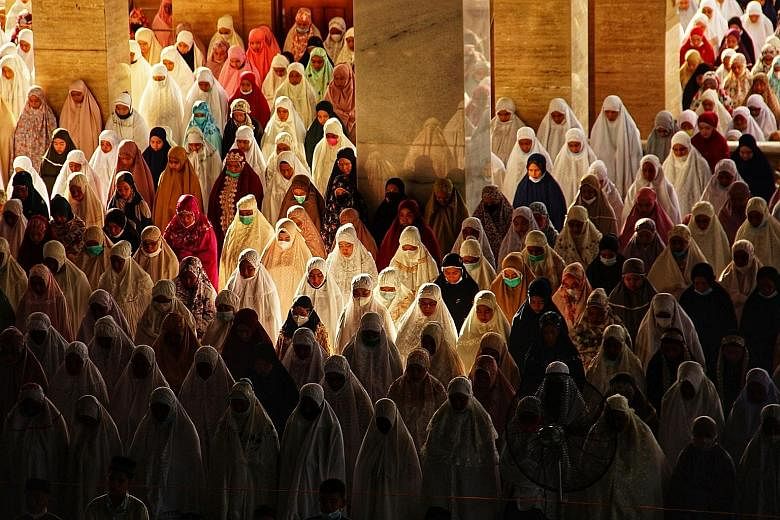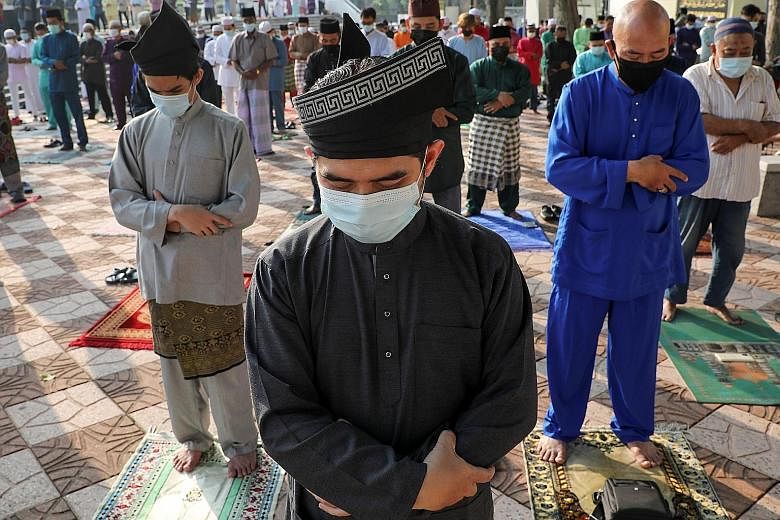KUALA LUMPUR/JAKARTA • Muslims in Indonesia and Malaysia celebrated a muted Hari Raya Aidilfitri for the second year yesterday, under the cloud of resurgent Covid-19 infections.
The governments of the two Muslim-majority nations have banned people from returning to their rural home towns and barred mass gatherings in homes.
Hari Raya Aidilfitri typically starts with a prayer service in the morning. Most mosques are open in the two countries this year, but with strict limits of just several dozen people inside, because of the need for physical distancing.
In Indonesia, the government shut mosques in high-risk areas for Idul Fitri, as Indonesians call the festival at the end of the fasting month.
Places of worship that are closed include Masjid Istiqlal, Indonesia's largest mosque, which is located in Jakarta and can accommodate up to 120,000 worshippers.
But many other mosques throughout the vast archipelago, which has three time zones, were open yesterday, with crowds often spilling into surrounding fields.
"(We are) very lucky that we can pray together this year, when we couldn't do it last year," Ms Tri Haryati Ningsih, 53, told Reuters at the Dian Al-Mahri mosque in Depok, a city south of Jakarta.
President Joko Widodo, who did not return to his home town of Solo in Central Java, performed his prayers with family members and several aides in the front yard of Bogor Palace in West Java, The Jakarta Post reported yesterday.
"We need to be patient and practise self-restraint," he had said earlier on YouTube, referring to people visiting their families. "This is indeed hard but we have no choice. We must prioritise our health and safety."
In the Malaysian capital of Kuala Lumpur, dozens of people turned up at Masjid Negara, the national mosque, wearing their colourful Hari Raya outfits. Some arrived as early as 6.30am for the 8am service, but most were turned away politely by policemen.
Masjid Negara can accommodate 15,000 people, but the Malaysian government has declared that only 50 people can gather inside any large place of worship for a prayer service during the four weeks of the movement control order that began on Wednesday.
Governments around the world are on high alert due to the spike in recent coronavirus cases, fuelled in part by faster-spreading variants.
Indonesia, South-east Asia's most populous country, has reported the highest number of Covid-19 infections - 1.72 million - and the highest death toll of 47,218.
New cases in Malaysia hit a three-month high of 4,855 yesterday, with its total number of cases topping 458,000.
In Indonesia, despite the ban on mudik - the annual exodus to celebrate Aidilfitri - 1.5 million people living in Greater Jakarta had left for their home towns, a Transportation Ministry survey found, the Kompas daily reported.
In Malaysia, thousands of people in big cities have been trying to sneak back to their home towns, with police forced to man lorong tikus - which literally means "rat routes", referring to dirt lanes away from the main highways - to turn them back.
In rural areas, people who have not seen their working children and grandchildren for two years lamented the curbs.
"We have to have a lot of patience though we sometimes cry because we really miss our children and grandchildren," Mr Mohd Daud Kalakhan, 75, from Papar town in Sabah, was quoted as saying by the Utusan Malaysia newspaper on Wednesday.


